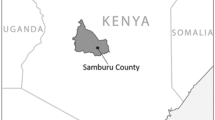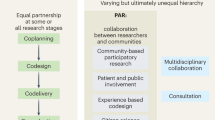Abstract
Community engagement in research has become increasingly important; it is essential for research conducted with Indigenous communities. In some cases, community members are receptively engaged in research from beginning to end, but this is inconsistent. Community collaboration during the results dissemination process is an element of engagement that is consistently overlooked or otherwise ineffectively executed. The concept of decolonizing research and the postcolonial theoretical foundations of decolonization are explored in this paper. Decolonizing research involves conducting research with Indigenous communities that places Indigenous voices and epistemologies at the center of the research process. This paper considers a decolonization framework to examine Native American community collaboration in the research results dissemination process including recommendations for applying postcolonial theory in the design of technologies to facilitate collaborative research results dissemination.
Access this chapter
Tax calculation will be finalised at checkout
Purchases are for personal use only
Similar content being viewed by others
Change history
19 March 2021
The chapter was inadvertently published with an incorrect wording of the main title: “Collaborative Research Results Dissemination: Applying Postcolonial Theory to Indigenous Community Collaboration in Research Results Dissemination” whereas it should read: “Collaborative Research Results Dissemination: Applying Postcolonial Theory to Indigenous Community Contexts”.
References
Simonds, V.W., Christopher, S.: Adapting western research methods to indigenous ways of knowing. Am. J. Public Health 103(12), 2185–2192 (2013)
Minkler, M., Salvatore, A.L., Chang, C.: Participatory Approaches for Study Design and Analysis in Dissemination and Implementation Research. Oxford University Press, New York (2017)
Fernandez, C.V., et al.: The return of research results to participants: pilot questionnaire of adolescents and parents of children with cancer. Pediatr. Blood Cancer 48(4), 441–446 (2007)
Shalowitz, D.I., Miller, F.G.: Communicating the results of clinical research to participants: attitudes, practices, and future directions. PLoS Med. 5(5), e91 (2008)
Ferris, L.E., Sass-Kortsak, A.: Sharing research findings with research participants and communities. Int. J. Occup. Environ. Med. 2(3), 172–181 (2011)
Chen, P.G., et al.: Dissemination of results in community-based participatory research. Am. J. Prev. Med. 39(4), 372–378 (2010)
MacKenzie, C.A., Christensen, J., Turner, S.: Advocating beyond the academy: dilemmas of communicating relevant research results. Qual. Res. 15(1), 105–121 (2015)
Smylie, J., Kaplan-Myrth, N., McShane, K.: Indigenous knowledge translation: baseline findings in a qualitative study of the pathways of health knowledge in three indigenous communities in Canada. Health Promot. Pract. 10(3), 436–446 (2009)
Pacheco, C.M., et al.: Moving forward: breaking the cycle of mistrust between American Indians and researchers. Am. J. Public Health 103(12), 2152–2159 (2013)
Havasupai Tribe of Havasupai Reservation v Arizona Board of Regents (2008)
Smith, L.T.: Decolonizing Methodologies: Research and Indigenous Peoples. Zed Books Ltd., London (2013)
Sium, A., et al.: Towards the ‘tangible unknown’: decolonization and the Indigenous future 1(1) (2012)
Saskamoose, J., et al.: Miýo-pimātisiwin developing indigenous cultural responsiveness theory (ICRT): improving indigenous health and well-being. Int. Indigenous Policy J. 8(4), 1–16 (2017)
Battiste, M.: Reclaiming Indigenous Voice and Vision. UBC Press, Vancouver (2011)
Lavallée, L.F.: Practical application of an Indigenous research framework and two qualitative Indigenous research methods: sharing circles and Anishnaabe symbol-based reflection. Int. J. Qual. Methods 8(1), 21–40 (2009)
Kovach, M.: Indigenous Methodologies: Characteristics, Conversations, and Contexts. University of Toronto Press, Toronto (2010)
Wilson, S.: Research Is Ceremony: Indigenous Research Methods. Fernwood Publishing, Halifax (2008)
Datta, R.: Traditional storytelling: an effective Indigenous research methodology and its implications for environmental research. AlterNat. Int. J. Indigenous Peoples 14(1), 35–44 (2017)
Kohn, M., Political Theories of Decolonization: Postcolonialism and the Problem of Foundations. Oxford University Press, New York (2011). McBride, K.D (ed.)
Juutilainen, S.A., Jeffrey, M., Stewart, S.: Methodology matters: designing a pilot study guided by indigenous epistemologies. Hum. Biol. 91(3), 141–151 (2020)
Bishop, R.: Addressing issues of self-determination and legitimation in Kaupapa Maori research, pp. 143–160 (1996)
Getty, G.A.: The journey between Western and Indigenous research paradigms. J. Transcult. Nurs. 21(1), 5–14 (2010)
Mohammed, S.A.: Moving beyond the “exotic”: applying postcolonial theory in health research. ANS Adv. Nurs. Sci. 29(2), 98–109 (2006)
Sharma, M.: ‘Can the patient speak?’: Postcolonialism and patient involvement in undergraduate and postgraduate medical education. Med. Educ. 52(5), 471–479 (2018)
Darroch, F., Giles, A.: Decolonizing health research: community-based participatory research and postcolonial feminist theory. Can. J. Action Res. 15(3), 22–36 (2014)
Henderson, J.S.Y.: Aboriginal Thought, in Reclaiming Indigenous Voice Vision, p. 248 (2000). Battiste, M. (ed.)
Chilisa, B.: Indigenous Research Methodologies. SAGE Publications, Thousand Oaks (2012)
Jernigan, V.B.B., D’Amico, E.J., Kaholokula, J.K.: Prevention research with indigenous communities to expedite dissemination and implementation efforts. Prev. Sci. 21, 74–82 (2018)
U.S. Department of the Interior Indian Affairs: Tribal leaders directory (2021). https://www.bia.gov/bia/ois/tribal-leaders-directory/. Accessed 01 Nov 2021
Hacker, K.: Community-Based Participatory Research. Sage Publications, Los Angeles (2013)
Wallerstein, N., Duran, B.: The conceptual, historical, and practice roots of community based participatory research and related participatory traditions, pp. 27–52 (2003)
Cooke, B., Kothari, U.: Participation: The New Tyranny?. Zed Books, London (2001)
James, R., et al.: Exploring pathways to trust: a tribal perspective on data sharing. Genet. Med. 16(11), 820–826 (2014)
Rivkin, I., et al.: Disseminating research in rural Yup’ik communities: challenges and ethical considerations in moving from discovery to intervention development. Int. J. Circumpolar Health 72 (2013)
Legaspi, A., Orr, E.: Disseminating research on community health and well-being: a collaboration between Alaska Native villages and the academe. Am. Indian Alsk. Native Ment. Health Res. 14(1), 24–43 (2007)
Dillard, D.A., et al.: Challenges in engaging and disseminating health research results among Alaska native and American Indian people in Southcentral Alaska. Am. Indian Alsk. Native Ment. Health Res. 25(1), 3–18 (2018)
Bowen, S., Martens, P.: Demystifying knowledge translation: learning from the community. J. Health Serv. Res. Policy 10(4), 203–211 (2005)
Elsabbagh, M., et al.: Community engagement and knowledge translation: progress and challenge in autism research. Autism 18(7), 771–781 (2014)
Boyd, A.D., Song, X., Furgal, C.M.: A systematic literature review of Cancer communication with indigenous populations in Canada and the United States. J. Cancer Educ., 1–15 (2019)
McDonald, M.E., et al.: What do we know about health-related knowledge translation in the Circumpolar North? Results from a scoping review. Int. J. Circumpolar Health 75, 18 (2016)
Timmons, V., et al.: Knowledge translation case study: a rural community collaborates with researchers to investigate health issues. J. Contin. Educ. Health Prof. 27(3), 183–187 (2007)
McDavitt, B., et al.: Dissemination as dialogue: building trust and sharing research findings through community engagement. Prev. Chronic Dis. 13, E38 (2016)
Author information
Authors and Affiliations
Corresponding author
Editor information
Editors and Affiliations
Rights and permissions
Copyright information
© 2021 Springer Nature Switzerland AG
About this paper
Cite this paper
Dirks, L.G. (2021). Collaborative Research Results Dissemination: Applying Postcolonial Theory to Indigenous Community Contexts. In: Toeppe, K., Yan, H., Chu, S.K.W. (eds) Diversity, Divergence, Dialogue. iConference 2021. Lecture Notes in Computer Science(), vol 12646. Springer, Cham. https://doi.org/10.1007/978-3-030-71305-8_33
Download citation
DOI: https://doi.org/10.1007/978-3-030-71305-8_33
Published:
Publisher Name: Springer, Cham
Print ISBN: 978-3-030-71304-1
Online ISBN: 978-3-030-71305-8
eBook Packages: Computer ScienceComputer Science (R0)




